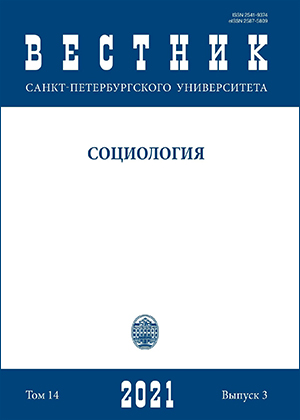Effects of digitalization during the pandemic in Russia and Belarus
DOI:
https://doi.org/10.21638/spbu12.2021.301Abstract
The article discusses changes in the nature of the employed population’s labor behavior associated with the pandemic and the spread of working remotely. The main goal of the article is to identify the effects of digitalization on workers’ labor. These effects of digitalization are revealed in the collective perceptions and assessments of workers of their individual abilities and capabilities in the development and use of digital technologies for the performance of professional tasks and career advancement in the open labor market. The article examines the effects of digitalization in the context of the massive spread of remote labor during the pandemic from a comparative perspective. It covers the working population of two large cities of the Union State — St. Petersburg and Minsk. The empirical analysis of the collective opinions of workers is based on data collected in two telephone surveys conducted in February — March 2021. The results of the study
showed that the population of the two cities responded in a similar way to the massive spread of remote work. The main result of changes in labor during the pandemic was a significant increase in fears and difficulties in using Information and Communication Technologies (ICT) among those workers who continued traditional work, and more than a twofold increase in the motivation to study digital technologies among all employed in the economy. At the same time, both in St. Petersburg and in Minsk, the maximum has been reached in terms of development of the remote mode of work. Also, in the process of technological renewal, the most vulnerable categories of workers (those who experience the greatest difficulties in mastering and using ICT) are identified. Determining which category will be the weakest depends largely on regional specifics of the organization and regulation of labor. However, one group finds itself in a persistently negative position — those with low incomes.
Keywords:
labor digitalization, labor market, phone survey, digital technologies, remote work, pandemic, Union State
Downloads
References
References
Downloads
Published
How to Cite
Issue
Section
License
Articles of "Vestnik of Saint Petersburg University. Sociology" are open access distributed under the terms of the License Agreement with Saint Petersburg State University, which permits to the authors unrestricted distribution and self-archiving free of charge.




